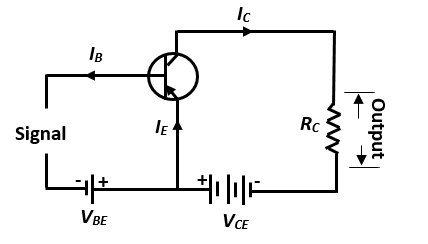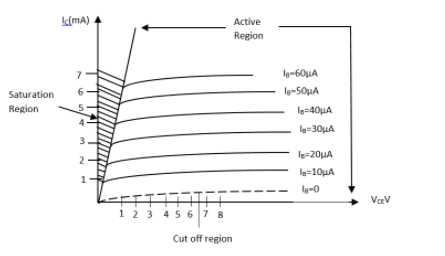Question
Question: In the saturation region the collector-base junction is _____ biased and the base-emitter junction i...
In the saturation region the collector-base junction is _____ biased and the base-emitter junction is _____ biased for a transistor.
A. Reverse, forward
B. Forward, reverse
C. Reverse, reverse
D. Forward, forward
Solution
Let us consider a common-emitter configuration of a p-n-p transistor.

Keeping the emitter grounded, the base is kept forward biased, as n type base of the transistor is connected with a negative pole of source VBE. Keeping the emitter grounded, the collector is kept at reverse bias, so the p type collector is connected to the negative pole of VCE.
In the figure,
The source voltage of input= VBE
The voltage of output= VCE
Base current= Input current= IB
Collector current= Output current= IC
Clearly,IE= IB+ IC
Among input and output currents and voltages only the input current (IB) and output voltage (VCE) can be changed easily according to the need. In CE circuits IB and VCE should be taken as independent variables and VBE as well as IC are two dependent functions of them. Out of theseVBE has less importance in the analysis of the circuit.
So,IC=f(IB,VCE).
Complete step by step answer:
The output characteristic is determined keeping IB at different values and the graphs of IC with respect to VCE. For different values of IB a series of different output characteristics is obtained and divided into three clear regions as mentioned in the following diagram:

In the active region the base-emitter is forward biased and collector-emitter junction is reversed biased.
In the cut-off region both junctions are reversed biased and in saturation region both base-emitter and base-collector junctions are forward biased as in this region high currents flows as both junctions of the transistor are forward biased and bulk resistance offered is very much less.
So, the correct answer is (D) forward, forward
Note: Transistor in the saturation region is considered as on state in digital logic. Same characteristics can be obtained for the n-p-n transistor of common emitter configuration.
